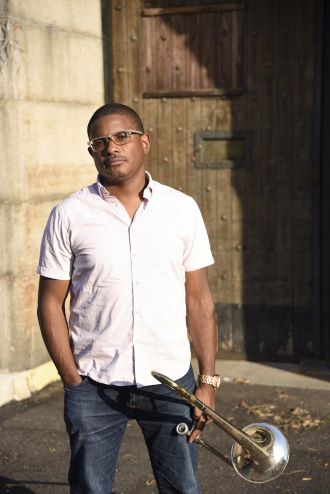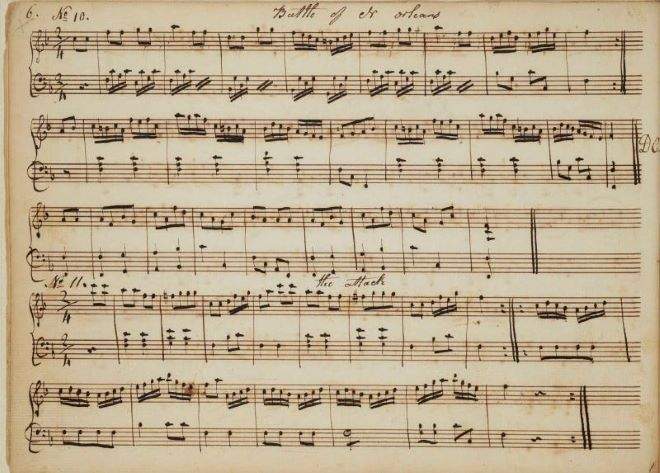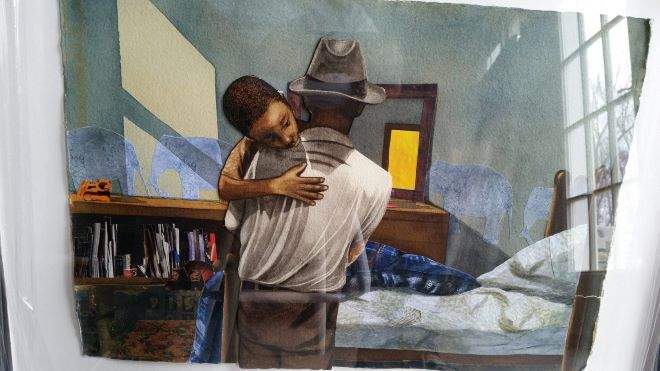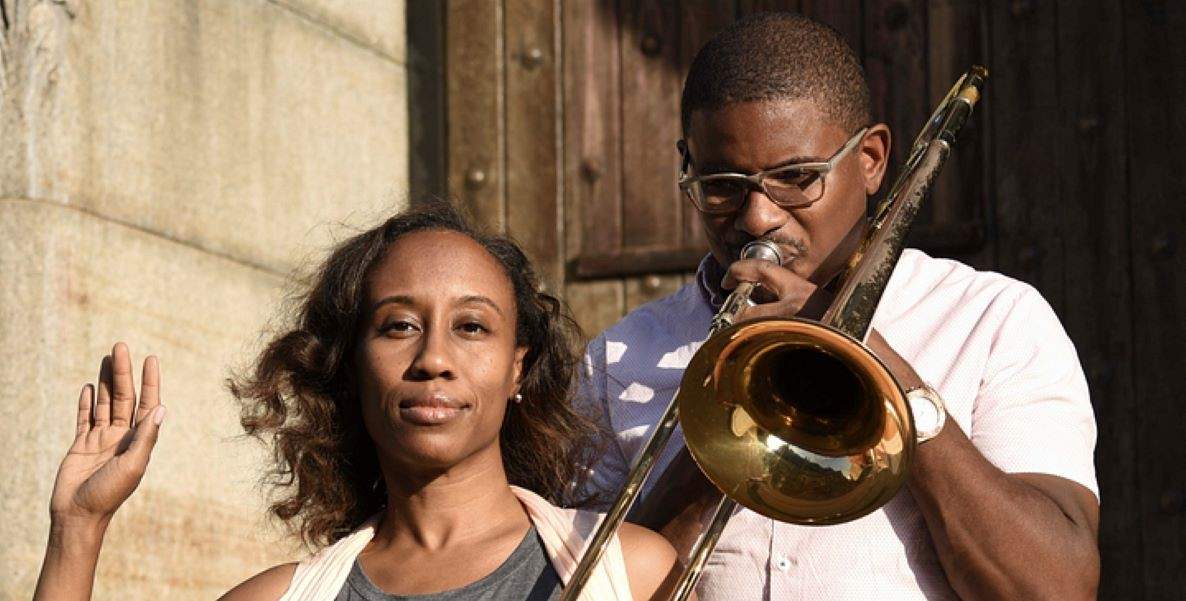When Brent White read Daniel Beaty’s Knock, Knock: My Dad’s Dream for Me to his children, something happened. A tune White had written years ago came back to him. White — trombonist, composer, assistant teaching professor at Drexel University, and electrical engineer — had played it at the Philadelphia Detention Center for a circle of men huddling together in a wide-open space used for basketball, performance, and church services. We taught together. The men had shared themselves through their journals; now they wanted to hear something from him.
In the wordless language of music, White’s tune spoke of fathers and sons separated. In that moment, it was hard to tell the player from his instrument. The trombone’s range matches a man’s tenor voice; the notes came out one by one, quiet and intense, ragged on the ends, with an occasional stumble, like a voice caught in the throat. Damned up tears that no one in the room could cry poured through us slowly. It had to be slow, because sadness takes its own damn time, especially when you’ve shut it down for so long.
One man told him to play something else. Play something happy.
“But that’s not what I wrote,” he said. “You said to play something I feel, and this is it. I’m being honest right now.”
Honesty was one of the principles of the writing-and-music group, started by composer/trumpeter Hannibal Lokumbe as outreach and inspiration for his work Can You Hear God Crying? Commissioned by the Philadelphia Chamber Music Society in 2010 and developed with partner Art Sanctuary, the piece required satellite prison-study groups that Hannibal called Music Liberation Orchestras, one here in Philadelphia’s Detention Center, another in Hannibal’s hometown of Bastrop, Texas. Hannibal visited Philadelphia monthly, I taught weekly, and White twice a week. A few core members built a safety that others who came and went said did not exist anywhere else in prison — or, for that matter, on the outside.

When Art Sanctuary took to the prison an excerpt of the final performance, with Valerie Gay, dressed in white, singing a soprano God, an incarcerated drummer named Angel played along. A kind of liberation did happen, that day and other times, and, yes, happiness. But the man who had demanded it of White early on had stayed for just a few sessions. He never got to share the times when we laughed together, or touched hands in a circle to move one pulse among us.
Back then, White says, he could not see how deep internal wounding from broken childhood relationships could be healed. In fact, when the Philadelphia Jazz Project invited him to create a “suite of music,” he used that tune he’d played for us as the anchor. “Broken Toy” referred not to what so many children have to play with, but to the children themselves — as if they were objects, toys, played with and broken by life.
White will perform the Broken Toy live on March 1, as part of Mandell Presents at Drexel University’s Mandell Theater.
The music that grew White
Before we worked with incarcerated men, and just after, White was playing his horn with bands and entertainers across the globe, including the magical Sun Ra Arkestra, John Legend, and locally, with salsa musicians who backed international headliners like Michael Stuart and the late Cano Estremera when they came to town. White had trained as an electrical engineer at Widener University in order never, ever to give trouble to the mother who had worked so hard to raise him. He knew, he said, how to be an “invisible sideman.” Play what’s needed, con mucho gusto, but no fuss. And any thoughts of leading his own band or composing his own music stayed neatly compartmentalized.
For a while he and his mother had lived in a shelter, and then in Wilson Park Projects, with the baby brother born when White was 11. He had to change schools; at his new Pepper Middle School, it happened. Music teacher Brian Pastor “put a horn in my hands.” It was all his own, this loaner instrument, with its shiny heft and a slide as long as his arm. He learned how to move the breath from his own body, buzz it through his lip, and send the air spinning through the horn and out into a room.
Where the music Brent White played in the prison courtyard was a cry of despair, there is something new here. This CD, he says, was a hinge, a “coming out” into a more complicated mending.
It was not music at first, but it was sound. It was his sound. Practice was his own, too, and the flow-experience of playing, listening, improving, and then achieving a musical tone. Incremental learning cannot be taken away. The trombone, he says with characteristically compact rhetoric, got him through middle school. Then, when his brother died at three years old, the trombone helped him through that, too.
White was accepted into the music program at Creative and Performing Arts High School. He carried his horn everywhere, so that his barber, Mr. Dennis, asked him how he liked J.J. Johnson (1924–2001). He’d never heard of him, so Mr. Dennis gave him a cassette tape. J.J. Johnson has been called the Charlie Parker of the trombone. White played and played and played the cassette, and listened. Walking, in school, in the morning, going to sleep. He tried to reproduce those gorgeous brass tones. Johnson’s sound became the soundtrack of his young life, and provided the discipline to get through an engineering degree with honors. Because who could imagine making a living through music?
And White, a man of faith, wanted not just a living, but a family and a life. As the gospel song says: “…the life I sing about in my song.” He married his sweetheart, dancer-choreographer Lauren Putty, and in 2014 the two created the Putty Dance Project to create striking original multi-media works. Lauren Putty-White’s dance, like White’s music, is both precise and improvisational. Together they created new music, and original dance pieces with visual and video elements, including the critically praised “Going Wanting in the Age of the Selfie,” about technology and relationships, and “iStand: Stories of an American Civil Struggle.”
In 2022, White, along with London-based oboist and researcher Dr. Uchenna Ngwe, received from the Library Company of Philadelphia a Francis Johnson Fellowship to study an 1820 manuscript of compositions by “one of the leading American musicians of the pre-Civil War era” — another Johnson, the Black composer and bandleader Francis (Frank) Johnson (1792–1844). White’s study resulted in “Code-Switching,” nine tunes of Johnson’s played and re-interpreted, including pieces that referred to deadly 19th-century conflicts, including Haitian Independence and the Battle of New Orleans.

By now, White and Putty-White had two young children. White had worked through Covid-era transitions at the Kimmel Center’s Education Department. He’d taught talented youth at the Clef Club as well as his stint in the Philadelphia Detention Center. Like Frank Johnson, he’d played music from the Caribbean. He used Frank Johnson’s scores as the basis for an album that partners with guitarist Matt Davis and others to imagine the musical “code-switching” the bandleader and his musicians must have had to use to play for Black and white, American and European, audiences.
The music that grew White has grown with him: through the Putty Dance Project, assembling and leading his own bands, and accepting the long-distance, ancestor-mentorship of the two Johnsons — J.J. and Frank who both, in different centuries, had played music, led bands, arranged, composed, and figured out how to tell truth through breath and brass for so many different audiences. They do not just model, but pour into White’s ear the joy that is central to African-American arts aesthetic: finding, crafting, forging forms to capture pain with exquisite precision. So that we are not alone with it, but can share it; stand it; and tell the story until we are healed. As author Franz Kafka says of books, music can break the frozen sea within us.
Who has not been or will not be broken?
Which returns us to the children’s book that spoke to White when he read it to his children and inspired “Broken Toy.” Knock, Knock: My Dad’s Dream for Me began as Daniel Beaty’s spoken-word poem. Artist Bryan Collier reports being moved — as a father and a son — by the story. “I saw Daniel Beaty perform the poem…on HBO’s ‘Def Poetry Jam,’ and I immediately called him. We then took the whole project to a publishing house and we got it done. The biggest challenge was that the book scares people because we left the father’s disappearance so open-ended. People don’t know if it was death, incarceration, or an obligation that took him away from his son.”
Collier’s watercolor and collage range from lush saturation to stern clarity. There’s more complexity than a child can articulate, but can take in and feel. Some may already have felt it. The book will keep them — and their torn-apart grown-ups — company.

Jazz will, too, of course. The 2019 notes on the original release dedicate White’s CD to “all children who suffer emotional damage that makes them broken and unable to be part of healthy relationships.” But White’s understanding has evolved. He will perform the Broken Toy live on March 1, 2023, part of Mandell Presents at Drexel University’s Mandell Theater. Band members for Mandell Presents will be Orrin Evans on piano and Ian Macaulay, guitar, from the CD; and Wayne Smith, Jr., drums; Nimrod Speaks, bass; and Drexel student Aleko Nicolacakis, trumpet. Lauren Putty White will dance.
Where the music Brent White played in the prison courtyard was a cry of despair, there is something new here. This CD, he says, was a hinge, a “coming out” into a more complicated mending. Like Collier, he creates as a father, responsible for his own tender children and all the children he has taught. We even hear his own child’s voice recorded into the CD (although not for this live concert). He’s even working with bassist and educator Nimrod Speaks to create a listener’s guide for Overbrook High School students.
Who has not been or will not be broken? Let’s play anyway.
Lorene Cary is a lecturer at Penn and author, most recently of Ladysitting: My Year with Nana at the End of Her Century, a care-taking memoir, and My General Tubman, a play about the complex journey of the abolitionist/activist that ran this year at Arden Theatre. She is the founder of #VoteThatJawn, the initiative to register and engage young voters.
![]() MORE ON ART AND ARTISTS IN PHILLY
MORE ON ART AND ARTISTS IN PHILLY




 belongs to Philly—and the late pal who believed in him
belongs to Philly—and the late pal who believed in him